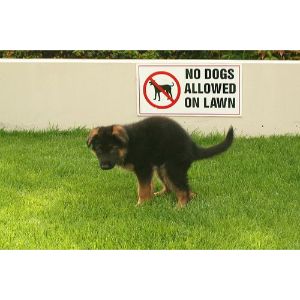
Whether you’ve discovered a new food brand that appears healthier or more affordable or you want to modify your dog’s diet, switching to a different dog food may involve challenges like more pooping.
These challenges could manifest in various ways, such as increased bowel movements, diarrhea, or constipation in your dog. So, why is your dog pooping more with new food?
The primary cause behind increased bowel movements in dogs when switching to new food is the need for their stomach to adapt to the change. Transitioning your dog gradually to the new meal type is advisable to minimize this effect.
However, as long as your dog appears healthy and comfortable, and the increased pooping or occurrence of dog diarrhea resolves within a week, there is no cause for concern.
Before reading this guide “Why Is My Dog Pooping More With New Food,” check out: Why Is My Dog’s Poop Cold? Causes and Treatments! (2023) and Why Is My Newborn Puppy’s Poop Green? (2023).
The Food Is Unsuitable

While rare, the new food may not suit your dog. It could contain ingredients your dog is allergic to, or their stomach may be sensitive to. Certain combinations of elements can also trigger reactions in dogs.
If your dog exhibits the following symptoms, it indicates that the new food is not appropriate, and it is advisable to seek veterinary assistance:
- Vomiting accompanied by diarrhea
- Excessive itching
- Lethargy
- Aggression
- Blood in the stool
- Persistent diarrhea lasting more than a week or two
When visiting the vet, remember to bring the packaging or label of the new food to show to the veterinarian.
Your Dog Is Overeating

Your dog thoroughly enjoyed the new food and consumed an enormous amount. The new food may require a smaller portion than the previous one, and inadvertently, you may have overfed your dog. Overeating can lead to increased bowel movements in dogs.
Your Dog Had Constipation
If your dog was experiencing constipation before the food change and is now recovering, it will likely have increased bowel movements. That could result from the body eliminating previously-stored waste it is now getting rid of.
Extra Moisture in the New Food

Dog food naturally contains a specific moisture content, but it does not necessarily mean water is in it. The moisture content is from the ingredients themselves.
You can check the label to determine if the new dog food has a higher moisture content.
As long as your dog receives an adequate intake of nutrients and water, there should be no cause for concern.
There Is More Fiber in the Food
The new food you’re providing your dog might contain more dietary fiber than the previous one. Fiber adds bulk to the stool and absorbs more water, which can result in increased bowel movements.
However, there’s no need to worry, as fiber is generally beneficial. Ensure you feed your dog an appropriate amount of fiber, as excessive intake can have side effects.
Your Dog Is Still Adjusting to the New Food

The primary cause of increased bowel movements when transitioning your dog to a new meal is often a rapid switch in food. The dog’s stomach struggles to adapt to such sudden changes, potentially resulting in diarrhea. However, this should subside within a few days or a week.
It’s crucial to avoid switching your dog’s food approach. Begin by feeding your dog a mixture of 90% old and 10% new food. Then, gradually increase the proportion of new food over time, allowing your dog’s stomach to adjust comfortably.
It’s important to note that increased pooping doesn’t always indicate that the new dog food isn’t suitable. Even when transitioning from a regular meal to a healthier homemade food, there may be temporary adverse effects on your dog’s stool.
What Can You Do to Help?

If your dog is struggling with new food, observing your pet for a day or more is advisable to see if they exhibit any adverse signs, such as vomiting, weakness, aggression, or bloody stools.
To address the issue, reduce the new food and gradually reintroduce it into their old diet. Usually, within a few days, your dog should show signs of improvement. However, if you remain concerned, it is always best to seek veterinary advice.
How Can You Prevent This?

It’s essential to follow these steps to ensure a proper transition of your dog to a new food:
- Confirm that the new food contains no ingredients your dog may be allergic to.
- Consulting with a veterinarian before initiating the transition is recommended.
- Understand that there is no one-size-fits-all dog food. You may need to experiment and find the one that suits your dog’s specific dietary needs.
Once you have considered these factors, begin the transition gradually, following the recommended approach suggested by the American Kennel Club:
Day 1
Introduce 25% of the new diet while maintaining 75% of the old diet.
Day 3

Adjust the ratio to 50% new and 50% old diets.
Day 5
Increase the new diet to 75% while reducing the old diet to 25%.
Day 7

Transition to a 100% new diet.
By following this method, you can ensure a smoother transition for your dog’s digestive system.
Frequently Asked Questions

The time it takes for a dog to adjust to a new food can vary depending on several factors, including individual preferences, sensitivity to dietary changes, and overall health. Generally, it is best to transition a dog’s food gradually over seven to 10 days.
If your dog is experiencing an increased frequency of bowel movements or excessive pooping after changing their food, there could be a few potential reasons for this:
Dietary change
Switching to a new food can disrupt your dog’s digestive system as it adjusts to the new ingredients and nutrient composition. The higher fiber content or different components in the new food may initially lead to more frequent bowel movements. In most cases, this should resolve as your dog’s digestive system adapts to the new food over time.
Food intolerance or sensitivity
Some dogs may have sensitivities or intolerances to certain ingredients in their new food. If the new food contains a component your dog is intolerant to, it can result in digestive upset and increased bowel movements. Common culprits include grains, dairy products, or specific proteins.
If you suspect this may be the case, consult your veterinarian to discuss alternative food options or conduct further investigations.
Overfeeding
If you have changed your dog’s food but still need to adjust the portion sizes accordingly, you may be overfeeding your dog. Overfeeding can lead to increased stool volume and more frequent bowel movements.
Ensure you follow the feeding guidelines provided by the new food and consider consulting with your veterinarian to determine the appropriate portion size for your dog.
Other health issues
Excessive pooping can also indicate an underlying health issue, such as gastrointestinal infections, parasites, or inflammatory bowel disease. Suppose the increased frequency of bowel movements persists for an extended period, and your dog shows other symptoms like diarrhea, vomiting, weight loss, or concerns about your dog’s health.
In that case, it’s essential to consult with your veterinarian for a thorough examination and appropriate diagnosis.
Dogs fed a fresh diet, such as a raw or homemade diet, may experience changes in their bowel movements compared to those provided with commercial dry or canned dog food. The specific effects on their poop can vary depending on various factors, including the ingredients used, nutrient composition, and the dog’s response.
Here are a few considerations:
Increased stool volume
Fresh diets often contain higher moisture content and fiber than processed commercial foods. That can result in larger stool volume. Additionally, fresh food diets may include more whole ingredients, such as fruits, vegetables, and bone matter, which can contribute to bulkier stools.
Firmer stools
Fresh food diets typically lack fillers, artificial additives, and preservatives commonly found in commercial foods. That can lead to firmer stools as the dog’s digestive system processes a more natural and less processed diet.
Improved digestion
Some dogs may experience improved digestion and nutrient absorption on fresh food diets. That can result in more efficient digestion and metabolism, which may lead to smaller and less frequent bowel movements.
If your dog is suddenly pooping more than usual, it may indicate an underlying issue that you should investigate. Here are potential reasons for the increased frequency of bowel movements in dogs:
Dietary changes
A sudden increase in the frequency of bowel movements can occur if there have been recent changes in your dog’s diet. Switching to a new food or introducing new treats or table scraps can disrupt their digestive system.
It is widespread if the new diet is higher in fiber or contains ingredients your dog does not eat frequently. Gradual transitions and monitoring their response can help minimize digestive upset.
Dietary indiscretion
If your dog has consumed something unusual or inappropriate, such as spoiled food, garbage, or toxic substances, it can lead to gastrointestinal upset and increased bowel movements. Other symptoms like diarrhea, vomiting, or abdominal discomfort often accompany that. Contact your veterinarian immediately if you suspect your dog has ingested something harmful.
Food intolerance or allergies
Dogs can develop intolerances or allergies to certain ingredients in their food. Common culprits include grains, dairy products, specific proteins (such as chicken or beef), or additives. Increased frequency of bowel movements, along with other symptoms like diarrhea, flatulence, or skin issues, can be signs of food sensitivity.
Your veterinarian can help identify potential dietary triggers through an elimination diet or other diagnostic methods.
Gastrointestinal issues
Several gastrointestinal conditions, such as gastroenteritis, inflammatory bowel disease, gastrointestinal infections, parasites (such as worms), or gastrointestinal tumors, can cause increased bowel movements.
These conditions may also be associated with other symptoms like diarrhea, vomiting, weight loss, or a change in appetite. A thorough examination by your veterinarian is crucial for diagnosing and treating these conditions.
Stress or anxiety
Dogs can experience increased bowel movements as a response to stress or anxiety. Changes in the household, routine, or environment can trigger such reactions. If you suspect stress or anxiety may be the cause, try to identify and address the underlying triggers. Behavioral interventions or medications may help manage stress-related bowel changes.
Medical conditions
Certain medical conditions, such as hyperthyroidism, diabetes, or exocrine pancreatic insufficiency, can affect digestion and result in increased bowel movements. These conditions often have other accompanying symptoms; a veterinary evaluation is necessary to diagnose and manage them appropriately.
The frequency of a dog’s bowel movements can vary depending on several factors, including age, size, diet, and individual metabolism. Most dogs have a regular bowel movement once or twice a day. However, it is normal for some dogs to go as many as three to four times a day or as few as every other day.
Here are general guidelines regarding dog poop frequency:
Puppies
Young puppies typically have more frequent bowel movements due to their developing digestive systems and higher metabolism. It is common for puppies to have multiple bowel movements throughout the day, ranging from three to five times or more.
Adult dogs
Adult dogs often have one to two daily bowel movements. However, some adult dogs may have slightly more or less frequent bowel movements depending on their diet and individual variation.
Senior dogs
As dogs age, their metabolism may slow down, and their bowel movements may become less frequent. Some old dogs may have a bowel movement every other day or even less frequently. However, it would help if you told your vet of any significant changes in bowel movement frequency to rule out any underlying health issues.
Conclusion for “Why Is My Dog Pooping More With New Food”

Switching to new dog food can increase bowel movements, but it is usually a temporary adjustment as the dog’s digestive system adapts. The primary cause of this change is the rapid switch in food, and a gradual transition is best to minimize discomfort.
However, increased pooping doesn’t always indicate the new food is unsuitable. Other factors such as overeating, constipation, extra moisture or fiber in the food, and the dog’s adjustment can contribute.
Observe your dog for any negative signs and consult a veterinarian if necessary. Following a proper transition process and considering the dog’s specific dietary needs can help prevent digestive issues when introducing a new food.
If your dog continues to poop excessively or shows concerning symptoms, seeking veterinary advice is recommended.
If you find this guide, “Why Is My Dog Pooping More With New Food,” helpful, check out:
- How to Massage a Dog to Poop! (2023)
- Why Is My Dog’s Poop Grainy? Common Reasons! (2023)
- Why Does My Dog Walk Around and Poop? (2023)
Learn more by watching “Why Is My Puppy Pooping So Much?” down below:
Garrett loves animals and is a huge advocate for all Doodle dog breeds. He owns his own Goldendoodle named Kona. In addition, he volunteers at the Humane Society of Silicon Valley, where he fosters dogs and helps animals. Garrett enjoys writing about Doodles and believes that dogs can teach humans more about how to live than humans can teach a dog.
Why Trust We Love Doodles?
At We Love Doodles, we’re a team of writers, veterinarians, and puppy trainers that love dogs. Our team of qualified experts researches and provides reliable information on a wide range of dog topics. Our reviews are based on customer feedback, hands-on testing, and in-depth analysis. We are fully transparent and honest to our community of dog owners and future owners.